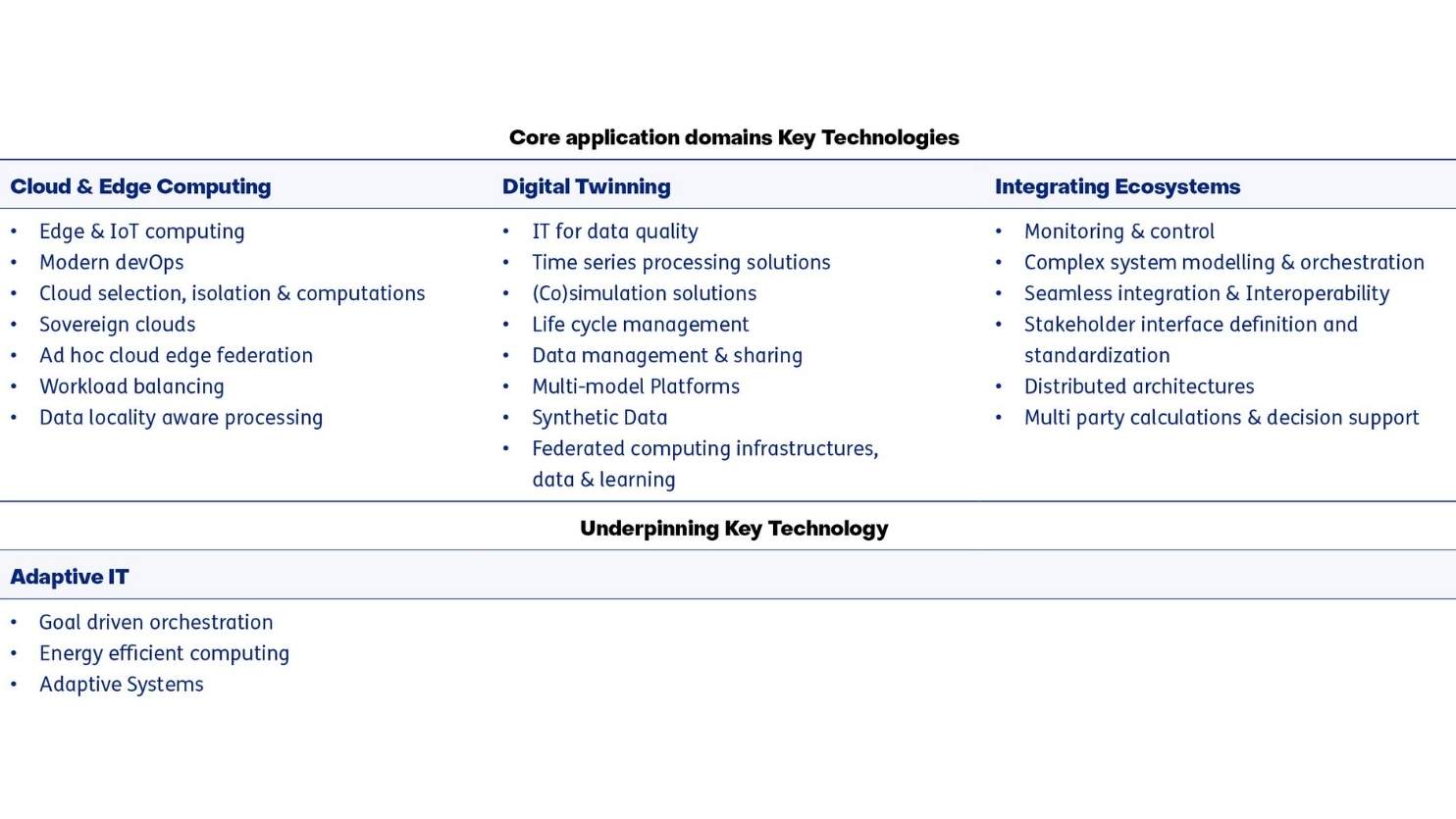Advanced Computing Engineering
The digital world is becoming increasingly complicated with more and more parts of society taking place digitally in complex, interconnected systems. Take self-driving cars, for example. The computer systems in these cars independently establish numerous connections: with the driver, other vehicles, the immediate environment, and various communication systems and networks. In this way, they retrieve more information than we can handle in a single system. This is why we work with distributed systems, which allow simultaneous access to data in different systems and combine the computing power of different systems. How do you develop reliable and affordable distributed systems? This is the research area of Advanced Computing Engineering (ACE).
ACE develops methods and technologies for designing, building, and managing distributed systems. We do this across a range of societal sectors, including energy, defence, smart industry, and IT. These domains are becoming increasingly dependent on distributed systems. This is making our research even more relevant and important.
Our goal is to contribute to distributed systems that move smoothly with the changing world. And making sure that everyone can continue to participate in that fast-changing, digital society.
The context in which ACE operates
At ACE, all our projects take into account the constant change and digitalisation of the domain in which we work. The main challenges are:
- Data explosion: the rapid pace of digitalisation is leading to a constant increase in data and its processing. To facilitate new collaborations, this data is increasingly being shared between different organisations, and the volume of data continues to grow.
- Exponential increase in digital systems: the data explosion means more systems are needed to store and connect this data. This leads to what is called: systems of systems.
- Speed of change: changes follow each other in uninterrupted succession, with new technologies appearing every year. Clients are constantly adapting their requirements to the latest trends. And changes to European and national regulations follow in quick succession.
- Importance of digitalisation for business: IT is increasingly central to business. On the one hand, companies are increasingly offering digital products and services. On the other hand, there is increasing internal digital control and optimisation of business and production processes (think of the energy transition or N=1 production).
- Growing connectedness: doing business means collaborating with other companies. Collaborative dynamics are rapidly increasing and the way people interact is quickly becoming digitalised and automated. This digital connectivity is making parties more interdependent. Consider, for example, how all train traffic in the Netherlands came to a standstill because one telecom operator’s mobile network went down.
ACE’s approach
ACE understands that the digital world is complex. At the heart of the above challenges is the complexity of large-scale systems, consisting of many heterogeneous components (often from different organisations) that must work together to achieve a common goal. ACE’s core competency is systems thinking and understanding all the different components that make up a system. This systems thinking is critical to all the major application areas in which we work. Without it, control over complex IT systems is lost.
To answer IT questions, we work with various market and other parties. To make that collaboration between parties run smoothly, we work according to the following principles:
1. Understanding, aligning, and appreciating the goals of each system
Businesses, people, and digital systems often have different perspectives and goals. Our challenge is to align the complex reality with operational processes and ensure that people and digital systems understand each other.
We solve this problem by applying first-time engineering and creating fit-for-purpose IT solutions where stakeholder interests are aligned and systems understand each other. We hope to make a valuable contribution to society through the IT solutions we create and advise on.
2. Connecting digital systems
Digital systems today are often part of a larger whole. Connecting all these systems can be difficult. We enable interoperability and allow communication between parties independently and across multiple systems.
We achieve this by unravelling, dissecting, and simplifying the problem. This helps us to understand the complexity of challenges, monolithic systems, and so-called vendor lock-ins. And allows us to then work on the seamless integration of digital systems.
3. Future-proofing digital systems
We want to be able to trust our digital systems to do what they are supposed to do, both today and in the future. This is not easy, as the context in which systems operate often changes over time. That’s why, at ACE, we ask: “Can your digital system handle change?”
ACE makes systems adaptive, reliable, and robust. In doing so, we take into account established assumptions and the system behaviour that may occur under changing conditions.
Projects
These principles are well reflected in the various projects we are involved in. For example:
- For Defence, we linked systems, vehicles, ships, aircraft, and troops within a NATO context. And we did so within a short timeframe and in difficult and changing circumstances.
- As part of the energy transition, we played a leading role in the development of the S2 standard, a communication standard for exchanging information between energy management systems and smart devices in the home, for example.
- For the European cloud provider market, we collaborate in two consortia. As part of one consortium, we are developing a unique field lab, a decentralised network of the data centres of the future. This is where innovations in modularity, advanced cooling, power, communications, networking, and cybersecurity technology converge. The other consortium focuses on promoting choice and switching options for professional and non-professional users of cloud solutions. One way we are doing this is by unbundling software and cloud solutions and working to develop open interfaces and open source software applications.
- For smart industry, we are developing data and digital twinning solutions that make production more flexible, responsive, and controllable. We define, standardise, and implement data models, connect them to individual machines, and integrate them with production operations management software. We are also working on AI-driven solutions to improve the throughput, production quality, and sustainability of physical products.
Expertise in 4 key technologies
Through years of experience, ACE has developed excellent IT expertise. This expertise mainly focuses on the following four key technologies:

Table containing the 4 key technologies, namely: Cloud & Edge Computing, Digital Twinning, Integrating Ecosystems, and Adaptive IT.
Working with ACE?
We help organisations develop methods and technologies for designing, building, and managing distributed systems. We do this with:
- Talented researchers who explore, innovate, and publish at the frontiers of known knowledge.
- People with practical experience, who understand the processes of organisations with digital systems and can come up with innovative solution, including first-time engineering where necessary.
- Consultants who advise clients from their overview and broad knowledge base.
Would you like to collaborate with TNO on distributed systems? Then please feel free to contact us.
Get inspired
TNO joins Dutch chip security company Fortaegis as partner and investor


HERACLES lays foundation for secure data sharing in healthcare sector


Data Ecosystems

Tiledmedia’s Razor-sharp VR Grabs the World’s Attention



